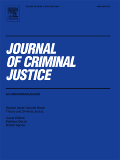
JOURNAL OF CRIMINAL JUSTICE
Scope & Guideline
Elevating standards in interdisciplinary research.
Introduction
Aims and Scopes
- Crime Prevention and Control:
Research focusing on effective strategies for crime prevention, including community policing, situational crime prevention, and intervention programs aimed at reducing recidivism. - Behavioral and Psychological Aspects of Crime:
Exploration of the psychological and behavioral factors contributing to criminal activity, including studies on mental health, personality traits, and the impact of adverse childhood experiences. - Policy Analysis and Reform:
Critical examination of criminal justice policies, their implementation, and the effects of reforms on crime rates and justice system efficacy. - Technology and Crime:
Investigations into the role of technology in crime detection, prevention, and law enforcement practices, including the use of body-worn cameras and machine learning in policing. - Social Justice and Inequality:
Analysis of the intersection of crime with social justice issues, including racial and ethnic disparities in the criminal justice system and the impact of socioeconomic factors on crime. - Criminal Justice System Dynamics:
Studies examining the interactions and relationships within the criminal justice system, including the roles of law enforcement, the judiciary, and correctional institutions.
Trending and Emerging
- Impact of COVID-19 on Crime and Policing:
A surge in research examining how the COVID-19 pandemic has influenced crime rates, police practices, and community responses, highlighting the need for adaptive strategies in law enforcement. - Mental Health and Criminal Justice:
An increasing focus on the intersection of mental health issues and criminal justice, exploring how mental health conditions affect offending behavior and justice system interactions. - Use of Technology in Policing:
Research into the application of advanced technologies, such as machine learning and data analytics, in crime prediction, policing strategies, and enhancing accountability within law enforcement. - Community and Restorative Justice Approaches:
A trend towards exploring community-based interventions and restorative justice practices that aim to repair harm and reduce recidivism through community involvement and support. - Racial and Ethnic Disparities in Criminal Justice:
Growing emphasis on understanding and addressing racial and ethnic disparities within the criminal justice system, focusing on systemic biases and their implications for policy reform. - Environmental Influences on Crime:
Emerging studies examining the role of environmental factors, such as neighborhood characteristics and urban design, in influencing crime patterns and community safety.
Declining or Waning
- Traditional Crime Categories:
Research focusing on traditional crime categories such as burglary and theft has seen a decline, possibly due to the increasing focus on more complex and systemic issues like drug-related crimes and violent offenses. - Historical Criminology:
While still relevant, studies specifically centered on historical perspectives of crime are less frequent, indicating a possible waning interest in examining crime through a strictly historical lens. - Focus on Individual Offenders:
There has been a noticeable shift away from studies that exclusively focus on individual offenders and their characteristics towards broader systemic analyses that include social and environmental factors. - Simplistic Models of Crime:
Research employing overly simplistic models of crime causation is declining, as the field increasingly recognizes the need for more nuanced, multifactorial approaches to understanding criminal behavior. - General Deterrence Theory:
The traditional focus on deterrence theory in relation to punishment and crime rates appears to be diminishing in favor of more comprehensive analyses that consider rehabilitation and restorative justice.
Similar Journals

Russian Journal of Criminology
Fostering critical analyses for a deeper understanding of crime.Russian Journal of Criminology (ISSN: 2500-4255, E-ISSN: 2500-1442) is an esteemed academic publication hosted by Baikal State University, dedicated to advancing the field of criminology. As a pivotal resource within the domains of law and social sciences, this journal offers a platform for scholars to disseminate innovative research, critical analyses, and comprehensive studies relevant to contemporary criminological issues. Although coverage has been discontinued in Scopus from 2020, the journal continues to provide valuable insights essential for professionals and researchers alike, with a focus on sociological and political perspectives on crime and justice systems. With its unique Russian context, the journal encourages a diverse array of submissions, facilitating a cross-cultural dialogue on criminology that contributes to global scholarship. Despite its current ranking of 478 out of 685 in law and 908 out of 1243 in sociology and political science, the Russian Journal of Criminology remains a vital resource for those seeking to explore the complexities of criminological phenomena and to further the academic discourse in this critical area of study.
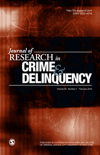
JOURNAL OF RESEARCH IN CRIME AND DELINQUENCY
Pioneering impactful research in the realm of criminal justice.JOURNAL OF RESEARCH IN CRIME AND DELINQUENCY, published by SAGE PUBLICATIONS INC, stands as a premier outlet for groundbreaking research in the fields of crime and delinquency. With an ISSN of 0022-4278 and an E-ISSN of 1552-731X, this esteemed journal has been disseminating vital knowledge since 1964 and continues to do so with a forward-looking perspective extending to 2024. Renowned for its impactful contributions, the journal ranks in the Q1 quartile of Social Psychology for 2023, reflecting its status among the top-tier publications in the field with a Scopus ranking of 66/310, placing it in the 78th percentile. Though it is not an Open Access journal, it remains a crucial resource for researchers, professionals, and students seeking to deepen their understanding of criminal behavior and social responses. With articles that address current issues and trends, JOURNAL OF RESEARCH IN CRIME AND DELINQUENCY plays an essential role in shaping policies and practices within the criminal justice system and academia.

Crime Science
Empowering researchers to tackle the challenges of crime.Crime Science, published by BMC, is a pioneering open access journal that has been at the forefront of interdisciplinary research since its inception in 2012. With its E-ISSN 2193-7680, this journal plays a crucial role in advancing knowledge across several vital domains including Cultural Studies, Law, Safety Research, and Urban Studies, with a remarkable Q1 ranking across all its categories in 2023. Situated in the United Kingdom, the journal boasts impressive Scopus rankings, placing it in the top 99th percentile for Cultural Studies and 95th percentile for Safety Research, among others. This strategic focus provides a platform for researchers, professionals, and students to explore the complexities of crime and its impact on society, aiming to foster informed discussions and innovative solutions. With a commitment to accessibility and a convergence period extending from 2013 to 2024, Crime Science not only promotes scholarly debate but also seeks to bridge theoretical insights and practical applications, making it an invaluable resource for anyone interested in the multifaceted aspects of crime and safety.

Revista Criminalidad
Illuminating Paths in Criminological ResearchRevista Criminalidad, published by POLICIA NAC COLOMBIA, is a distinguished academic journal that has been open access since 1958, making critical research in the field of criminology readily available to the global scholarly community. Based in Colombia, this journal serves as a prominent platform for the dissemination of high-quality research on crime, law, and social sciences. Notably categorized in various quartiles for 2023, including Q2 in Arts and Humanities (miscellaneous) and Q3 in Law, it holds respectable rankings in the Scopus database, reflecting its significance and contribution to both academic and practical discourse. The journal invites researchers, professionals, and students to explore its comprehensive scope, spanning vital themes relevant to criminology and public safety, making it an essential resource for those invested in the interplay between society, law, and criminal behavior. For up-to-date research and insights, the journal is accessible at the CENTRO INVESTIGACIONES CRIMINOLOGICAS DIJIN, AVE EL DORADO 75-25, BOGOTA.

Women & Criminal Justice
Fostering Dialogue for Gender Equity in JusticeWomen & Criminal Justice, published by Routledge Journals, Taylor & Francis Ltd, stands as a prominent platform for scholarly discourse in the intertwined realms of gender studies and legal research. Since its inception in 1989, this journal has been pivotal in addressing the unique challenges and perspectives of women within the criminal justice system, making substantial contributions to the field. With a commendable impact factor reflected in its Q1 ranking in Law and Q2 ranking in Gender Studies, it offers both researchers and practitioners rigorous and insightful analyses. The journal covers a wide spectrum of topics, aligning contemporary issues with legal frameworks, while advocating for a nuanced understanding of gender-related injustices. Though it operates under a traditional access model, its invaluable insights foster essential discussions among academics, policymakers, and social advocates. By engaging with themes of societal crime, victimization, and justice reform, Women & Criminal Justice continues to underscore the importance of integrating gender awareness into legal scholarship and practice, thereby enriching the broader academic community.

Journal of Penal Law and Criminology-Ceza Hukuku ve Kriminoloji Dergisi
Shaping the Future of Criminological ResearchThe Journal of Penal Law and Criminology-Ceza Hukuku ve Kriminoloji Dergisi, published by ISTANBUL UNIV, is a prestigious platform dedicated to the advancement of knowledge in the fields of criminal law and criminology. With its Open Access policy adopted since 2017, it aims to promote the dissemination of research findings and theoretical discussions, ensuring that vital insights in criminal justice, legal reforms, and criminological studies are accessible to a global audience. This journal serves as a vital resource for academics, legal practitioners, and students alike, fostering interdisciplinary dialogue and encouraging innovative research. By focusing on contemporary issues in penal law and criminology, the journal enhances understanding and addresses the complexities of justice in a rapidly changing society. With an ISSN of 2148-6646 and an E-ISSN of 2602-3911, it continuously strives to maintain high scholarly standards and relevance in its contributions to the field.
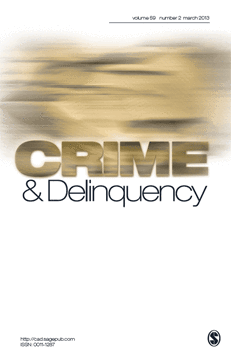
CRIME & DELINQUENCY
Exploring the complexities of criminal behavior.CRIME & DELINQUENCY, published by SAGE PUBLICATIONS INC, is a premier journal dedicated to advancing the study of criminology and criminal justice. With an esteemed ISSN of 0011-1287 and E-ISSN 1552-387X, this influential journal has been a vital resource since its inception in 1955, continuing to engage in rigorous research and discourse through to 2024. Recognized with a Q1 ranking in both Law and Pathology and Forensic Medicine, CRIME & DELINQUENCY boasts an impressive Scopus ranking, placing it in the top 8% of journals in Social Sciences - Law and the top 31% in Medicine - Pathology and Forensic Medicine. This journal serves as an essential forum for researchers, professionals, and students to explore pressing issues related to crime, delinquency, and their societal implications. Although not an open-access journal, it offers a valuable repository of insightful research and analysis that informs practices and policies within the field. To stay abreast of the latest findings and contribute to the ongoing discourse, CRIME & DELINQUENCY is a must-read for all committed to understanding and addressing criminal behavior in society.
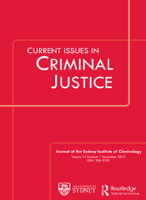
Current Issues in Criminal Justice
Connecting Scholars and Practitioners in JusticeCurrent Issues in Criminal Justice is a leading academic journal aimed at advancing research in the field of criminal justice, published by Routledge Journals, Taylor & Francis Ltd. With an impressive Q1 ranking in Law and a Scopus rank of #129 out of 1025, placing it in the 87th percentile of its field, this journal is recognized for its significant contribution to scholarly discussion and policy analysis. Covering topics from legal systems, crime prevention, and contemporary justice challenges, Current Issues in Criminal Justice serves as a vital resource for researchers, practitioners, and students seeking to explore pressing issues and innovative solutions within the justice system. The journal's commitment to high-quality, peer-reviewed research ensures that it remains at the forefront of legal scholarship, fostering interdisciplinary dialogue and informing policy development in the United Kingdom and beyond. With access options tailored for academics and practitioners alike, this journal is essential for those invested in the future of criminal justice research.
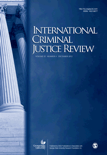
International Criminal Justice Review
Elevating discourse on global justice issues.International Criminal Justice Review is a premier journal in the field of law, published by SAGE Publications Inc, renowned for its commitment to advancing the understanding of criminal justice issues on a global scale. With an ISSN of 1057-5677, this journal spans a rich history from its inception in 1991 to its ongoing contributions into 2024, supporting a diverse array of research that addresses both theoretical and practical concerns in international criminal law. The journal holds a prestigious Q1 ranking in the Law category for 2023, reflecting its influence and relevance, as evidenced by its impressive Scopus rank of #68 out of 1025 in the Social Sciences Law field, placing it in the 93rd percentile. Though not an open-access journal, it provides vital access options for institutions and individuals alike. International Criminal Justice Review serves as a critical resource for researchers, practitioners, and students dedicated to exploring the complexities of international criminal justice systems, offering a platform for innovative scholarship that informs policy and practice worldwide.
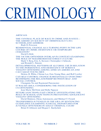
CRIMINOLOGY
Navigating the Intricacies of Crime and Its Impact.CRIMINOLOGY, published by WILEY, stands as a leading journal in the fields of Law and Forensic Medicine, with an impressive impact factor that places it in the Q1 quartile for both categories. With its ISSN 0011-1384 and E-ISSN 1745-9125, this esteemed journal has been at the forefront of advancing knowledge and understanding in criminological theories and practices since its inception in 1963, and continues to be relevant through 2024. As of 2023, CRIMINOLOGY is ranked #19 in Social Sciences_ Law and #19 in Medicine_ Pathology and Forensic Medicine, positioning it within the top 2% of its field, making it an essential resource for researchers and professionals alike. Despite not offering open access, it provides invaluable insights into the complexities of crime, law enforcement, and societal impacts, thus shaping the future of criminological research and policy.